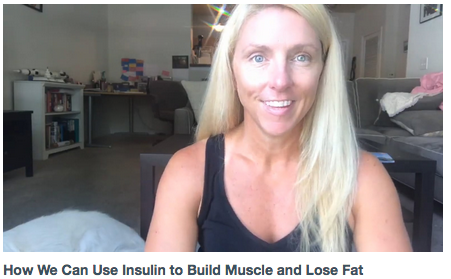Insulin can be looked as simply, as a storage hormone.
Insulin is responsible for telling the liver to stop making sugar and getting the liver to store it’s own sugar.
Insulin is responsible for getting fat cells to store their own fat.
Insulin is responsible for getting our cells, fat and muscle, to accept glucose (blood sugar.)
Insulin is responsible for getting our muscle cells to accept sugar and amino acids.
It is undeniable that insulin plays a very important role in our body and it can be manipulated to help us burn fat and build muscle. Find out how in this video..
[video_player type=”embed” style=”1″ dimensions=”560×315″ width=”560″ height=”315″ align=”center” margin_top=”0″ margin_bottom=”20″ ipad_color=”black”]![]() [/video_player]
[/video_player]
First, let’s talk about what impacts the insulin in our bodies..
First and foremost, the food we eat impacts our insulin. Protein and fiber have some but a minimal affect, on our insulin levels; fat alone has none; carbohydrates affect our insulin (go here to learn more about carbs); carbs and fat together are a double whammy in how they affect our insulin.
Carbohydrates can make insulin spike (glycemic index) and carbohydrates can make insulin be elevated for an extended amount of time (glycemic load.) To learn more about the glycemic index and glycemic load, read this.
Fiber reduces the glycemic index of a food or meal as does protein. Protein stimulates glucagon which directly opposes insulin, which is why it balances insulin.
The other major impact on our insulin is cortisol and catecholamines AKA stress hormones. These hormones naturally elevate insulin, and you can learn more about cortisol and catecholamines here.
Not only does insulin cause us to store by default, it also suppresses hormone sensitive lipase, an enzyme secreted in our body, that burns fat, and it raises lipo protein lipase, a fat storing enzyme.
So the bad part about insulin being storage hormone so if you have excess fat storage (over 30% body fat or more) and your insulin is elevated it can cause more fat storage. This is why adding protein to your carbohydrates is good. Rather than just having a bagel, make sure you have a bagel with lox. Or instead of having a bowl of oats, add some greek yogurt to your snack. And even worse than having occasionally elevated insulin, if your insulin is chronically elevated it can lead to insulin resistance and eventually diabetes.
But, on the flip side, after you workout, an insulin boost is not bad, especially if you are lean and trying to build muscle. First, exercise tells the glucose receptors in our body to open up and accept sugar, so we are primed and ready to go. Then, if you boost your insulin after you train, this can make our muscle cells accept sugar and amino acids to help them repair and build themselves. So if you are under 20-25% body fat, I would try eating fast digesting protein like whey isolate protein powder and starchy carbs like rice milk, rice cakes or sweet potato.
Do you need help figuring out the right clean eating meal plan for you?
Go to Commit2FitCoaching.com/freeassessment and let me help you.
Your Coach,
Kyra
P.S. Everyone is different. Some people need more carbs than others. It’s all individualized which is why I run #Commit2Fit with personalized clean eating meal plans. Everything should be custom and designed specifically for YOU.
